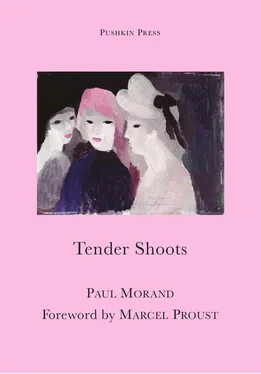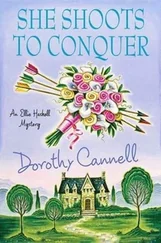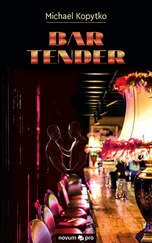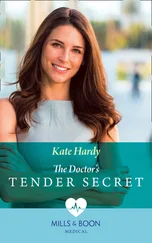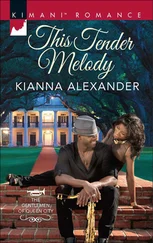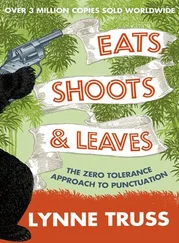Paul Morand - Tender Shoots
Здесь есть возможность читать онлайн «Paul Morand - Tender Shoots» весь текст электронной книги совершенно бесплатно (целиком полную версию без сокращений). В некоторых случаях можно слушать аудио, скачать через торрент в формате fb2 и присутствует краткое содержание. Год выпуска: 2011, Издательство: Pushkin Press, Жанр: Классическая проза, на английском языке. Описание произведения, (предисловие) а так же отзывы посетителей доступны на портале библиотеки ЛибКат.
- Название:Tender Shoots
- Автор:
- Издательство:Pushkin Press
- Жанр:
- Год:2011
- ISBN:нет данных
- Рейтинг книги:5 / 5. Голосов: 1
-
Избранное:Добавить в избранное
- Отзывы:
-
Ваша оценка:
- 100
- 1
- 2
- 3
- 4
- 5
Tender Shoots: краткое содержание, описание и аннотация
Предлагаем к чтению аннотацию, описание, краткое содержание или предисловие (зависит от того, что написал сам автор книги «Tender Shoots»). Если вы не нашли необходимую информацию о книге — напишите в комментариях, мы постараемся отыскать её.
Tender Shoots — читать онлайн бесплатно полную книгу (весь текст) целиком
Ниже представлен текст книги, разбитый по страницам. Система сохранения места последней прочитанной страницы, позволяет с удобством читать онлайн бесплатно книгу «Tender Shoots», без необходимости каждый раз заново искать на чём Вы остановились. Поставьте закладку, и сможете в любой момент перейти на страницу, на которой закончили чтение.
Интервал:
Закладка:
At the other two, the darkness that remained in the corners disappears, rises up to the ceiling where the eye pursues it. Along the entire height of the twenty-foot walls extend arches in relief, supporting windows.
Aurora pokes the fire in the stove. Its glow spreads over the wooden floor and settles in a distant mirror. The room is bare. Here and there, on pedestals, ancient casts with a waxy patina. At the back, a raised platform.
It is the hearing chamber of a law court not used since the end of George IV’s reign. There are still inscriptions above the doors — PUBLIC ENTRANCE, DEFENDANT, CROWN PROSECUTOR, ATTORNEY-GENERAL. Below the judge’s dais, the local Apollo; at his feet, a mechanical piano. No other furniture apart from two sofas, the jury box, some African footstools, some fabrics with geometric patterns from the Zambesi.
“This is my house,” says Aurora. “It’s a trunk, really. I’ve nothing else in the world apart from these plaster-casts, my dresses and my guns. I once had a large house in Portman Square, with furniture, guests and servants who passed things around on trays. I’m not possessive, I’ve kept nothing. I’m poor. I’ve gradually detached myself from all the bonds that the things we love impose on us, for their beauty, their value or the memories we attach to them.”
“And now?”
“Now I am on my own in life, sitting on crates, face to face with myself.”
“You are as beautiful as another man’s wife, Aurora. Is it true you don’t belong to anyone?”
“No one must come into my life.”
“Do you love your body?”
“It’s a storeroom that is consigned to me. I don’t put foul thoughts or food that is unclean into it, I look after it, I respect it, I dress it simply … I’m thirsty.”
From the floor, by the wall, she picks up a bottle of Australian burgundy, Chambertin Big-Tree, and takes a swig.
Once again Aurora got on my nerves:
“You’re probably a reformist, a vegetarian, a eurhythmist, a teetotaller? I loathe this defiance of good manners, this puritan and pagan readjustment of society.”
“You’re mistaken, there’s nothing systematic about me; I’m a Canadian girl who’s fond of the simple life.”
“Since when?”
“Always. I don’t remember having danced or held a gun for the first time … but tonight, for the first time, I feel weary. Gina dragged me off after the theatre to the place where we met. I’m sorry. I’m very weary. I look at the distance I still have to cover, as bad runners do, and I hesitate. Theatrical displays eat up my vitality. You saw me in the car … I am weak, nervous … and you’re witnessing all that … It’s weird …”
Morning sleep will restore her. But she begs me not to leave her alone, to come upstairs with her, saying that she is going to take a bath.
I am learning about the simple life.
Above the door of the little staircase — LORD CHIEF JUSTICE’ S ROB ING-ROOM. We go in — it is the bathroom.
She cries out:
“Into the water, Aurora! …”
She undresses in the most natural way, gets into the water, soaps herself, lets the water flow over her body. Perfect body. The muscles in her back ripple like balls of ivory beneath her taut, tanned skin, a substance that is both sturdy and priceless, like the silk used for air-balloons; they can be deciphered as easily as on an anatomy chart, where they cover our organs with pink arborescences; arched loins where the water streams, protruding breasts and, shorn of all heaviness through dancing, long legs, elongated at the ankles, hollowed out on the inside of the thighs, swollen at the supple junction of the knees.
“Come on, Aurora! Out of the water!”
She talks to herself like this, just as she talks to her clothes, to objects. (A habit, she explains, common to all lonely people who spend months without seeing their fellow creatures and for whom the human voice is necessary, as the tuning-fork for all other sounds.)
She pats herself dry, rubbing her face unceremoniously until it turns blood-red. No powder, no make-up, no perfume.
“Why are you laughing?”
“For the first time,” I say, “I am laughing when I think of a corset, a detachable collar or boots with buttons …”
In the room there is a pleasant smell of washed flesh, soap, alcohol, steam. Aurora pulls open the chest of drawers where ribbons and scarves are laid out in colours, as if in a prism — she puts on a crêpe-de-chine veil and goes downstairs to the studio again.
The gas butterflies return to their cocoons. Aurora wraps herself in woollen blankets, stretches out on a mattress laid out on the floor. Then she makes sure that her revolver is under the bolster. Her arms and her bare shoulders jut out from the improvised bed. You can see her straight nose in the midst of tousled hair. You can see her eyes. Then you see them no more.
I leave the studio and set off to have a coffee in the cab drivers’ shelter.
I went back to Aurora’s.
My work completed, I was making my way to the area by the river where the North Sea breeze was driving the smoke clouds towards the west, and beating back the seagulls and the smell of exposed mudflats towards the City. The roads that led me were barely made up and pitted with puddles, and already had a smell of the fields, a promise of countryside.
“You must come out of town with me,” Aurora said. “I shall teach you to live as we savages do. In the time you need to have lunch in the restaurant, we shall be naked in a river or else we shall go for a run in the woods. On summer nights I shall take you to sleep in the open air on Oliver’s roof terrace, from where you can see the Crystal Palace, gleaming in the distance like a carbuncle in the moonlight. You’ll feel much better, you won’t have any more headaches, your hair will stop falling out and you’ll stop desiring your friends’ mistresses, as Frenchmen do.”
The taxi pulls up in the middle of the road, as though it had broken down. But the driver does not blaspheme, does not open his bonnet. He opens the door for me — I have arrived. I had promised to be in Epping Forest at seven o’clock, here I am.
It is a September evening, slightly chilly. The giant beech trees do not appear to weigh heavily on the fresh, springy earth, nor do their shadows, or the human toil (though does the toil of English farmers weigh heavily?). On the river the gramophones have ceased crackling. The deer are grazing in the dawn mist.
Aurora had promised to be here at seven o’clock. But she probably sets her path by the sun and will use this cloudy weather, just as her sisters would a traffic jam, as an excuse for being late. Suddenly the branches crackle beneath the lightest of weights, like that of a doe. I turn round — here is Aurora. She runs towards me and her tunic clings to her body like those of the Victories. She holds an attaché case in her hand. She runs on tiptoes, in even strides, well balanced with the motion of her hips. At thirty paces from me, she slows down. Her face, which was merely a clear disc, takes shape, divided in two horizontal parts by her prominent cheekbones, enhanced by a short, mobile nose, like a police dog’s. Her momentum gradually relaxes and by the time she reaches me, she is walking. She lays her bag on the ground, then both hands on my arm.
“I’m glad you’ve come.”
“How long have you been here, Aurora?”
“Since yesterday evening. I slept out in the open. On leaving the theatre, Gina drove me here and left me. I climbed up to the Hollow Oak; stretched out on the grass, I ate apples; I could see London between the branches. This morning, I went down to the village, from where I telephoned you.”
“This outfit, Aurora, you’re going to get yourself arrested.”
Читать дальшеИнтервал:
Закладка:
Похожие книги на «Tender Shoots»
Представляем Вашему вниманию похожие книги на «Tender Shoots» списком для выбора. Мы отобрали схожую по названию и смыслу литературу в надежде предоставить читателям больше вариантов отыскать новые, интересные, ещё непрочитанные произведения.
Обсуждение, отзывы о книге «Tender Shoots» и просто собственные мнения читателей. Оставьте ваши комментарии, напишите, что Вы думаете о произведении, его смысле или главных героях. Укажите что конкретно понравилось, а что нет, и почему Вы так считаете.
